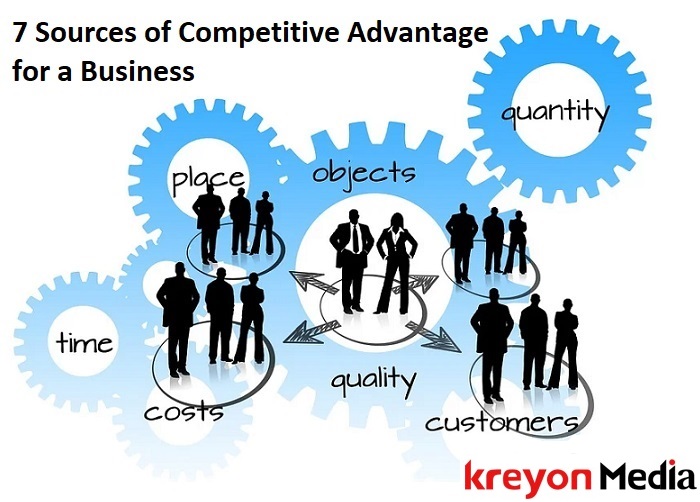
Competitive advantage is the basis of differentiation, growth and prosperity for a business. It makes a business better than its competitors. Without significant competitive advantage a business may flounder. Great companies are built on competitive advantages that makes it hard to replace them. Think of it, Apple, Google, & Amazon are all companies with remarkable competitive advantages compared to their competitors. In many cases, companies like Google, Facebook & DeBeers are able to establish monopolies because no competitor can match them.
While it may not be possible for most companies to establish monopolies, however, strong competitive advantages can help them grab a greater market share and dominance. Here’s a look at specific ways and sources to build competitive advantage for a business.
1. Products & Services
If your business offers better products and services than its competitors, it is a great competitive advantage. The products and services could be better for a specific customer base or location. Great products attract customers, build loyal following and help a business. A lot of companies make the mistake of marketing things without paying enough attention to building products or services.
Great companies are always built on the quality of their products and services. Take for e.g. how Apple was able to dominate the smartphone market by launching the iphones. Zappos created a market around its much touted customer service.
2. People

The top companies in business are built on its people. More so if you’re in modern businesses, which are driven by software and technology. The ways teams work and gel with each other has a significant bearing on its products and services.
“The secret of my success is that we have gone to exceptional lengths to hire the best people in the world. And when you’re in a field where the dynamic range is 25 to 1, boy, does it pay off.”
Steve Jobs
A business can gain significant advantage when it has a stable talent pool and it can attract the best people to work for it. When the dynamics of a business change, its people can make a big difference. The best companies are built on the strength of its people. The hiring processes, retention strategies and long term growth prospects of a company are all integral to its success.
3. Operations & Processes
The operations and processes of a company have a significant bearing on its key performance metrics. When the processes are well defined, it makes it easier for employees to excel. They know what is expected of them and what they need to do in order to excel. Companies with well optimised processes can deliver quality products with higher efficiency and quality than their counterparts. They can utilise resources better and deliver better products and services.
Companies with well defined processes and systems can be more effective in reaching their business goals like managing products, quality control, customer service, onboarding employees, and sales targets. Well defined processes and systems provide employees support for performing better. It ultimately leads to a significant competitive advantage.
4. Design Thinking

Design thinking is the way different facets of a business fit together to provide compelling solutions to the end users. In the world driven by digital technology, design thinking is playing a prominent role in shaping the solutions. It is taking constraints, evaluating the user environment and providing solutions that work for the end users.
Companies like AirBnB have transformed themselves from a failing startup to a centi billion dollar public company riding on design thinking. The AirBnb team used design thinking effectively to solve problems for its users. They understood how key elements related to user experience needed to be solved with careful considerations of design.
5. Digital Tools & Technology
Digital tools and technology are at the forefront today. They are dictating the customer experience, driving business processes & innovations. Companies that are using technologies in their core business processes are reaping rewards for it. They are able to adapt faster and deliver state of the art services for their customers.
Many businesses have turned traditional industries on their heads owing to the use of technology. Companies are leveraging data and integrated systems to deliver them business insights for proactive decision making and management.
Digital tools and technologies are assisting businesses to:
Improve communication between teams
Analyse business data with relevant action items
Improve Customer interactions and experience
Innovations with technology driven processes and patentable ideas
Flexible work environment
Personalisation for customers
Customers are far likely to do business with companies that use state of the art digital tools today. It helps them connect with them and get instant access to resources, products/services and support they need.
6. Innovations & Intellectual Property

The ability of a business to build new innovations contributes to its long term success. A viable business is born, when a company innovates and is able to grab the market effectively. The most successful companies build processes where its teams can experiment and launch new ideas.
Businesses have to evaluate their products and services in line with the changing landscape of the customer’s needs. They need to have a framework and processes for trying out new ideas to gain the competitive advantage. Here’s a list of some questions that can help you understand your position with respect to innovations:
Is your business built on innovations that make a difference?
What are your key intellectual assets and properties?
Is your business strategically investing in building new capabilities?
Are you able to innovate and build better products or services than your competitors?
Is your business model ready to adapt to sudden changes in the marketplace?
Are you succeeding in winning customers with your innovations?
Are you building tools that are useful for your customers?
7. Leadership
The leadership of a business is its driving force. Businesses assume a personality of its leadership. One can never imagine Apple without Steve Jobs, Virgin without Richard Branson and Microsoft without Bill Gates. The leadership of a company drives its products, people and business.
Visionary leadership helps a company build a good differentiation strategy. It helps the company answer questions like why it exists with utmost honesty. This is what great leadership does. It gives a reason for people to believe in something, it gives them a cause they want to fight for, a wrong they want to right and a mission they’re ready to die for. This is what great leaders do for their companies. When people know what you stand for, they are invariably ready to lend support to you & help you in your mission. The way a company is being led can create an ultimate differentiation for its business in the long run.







